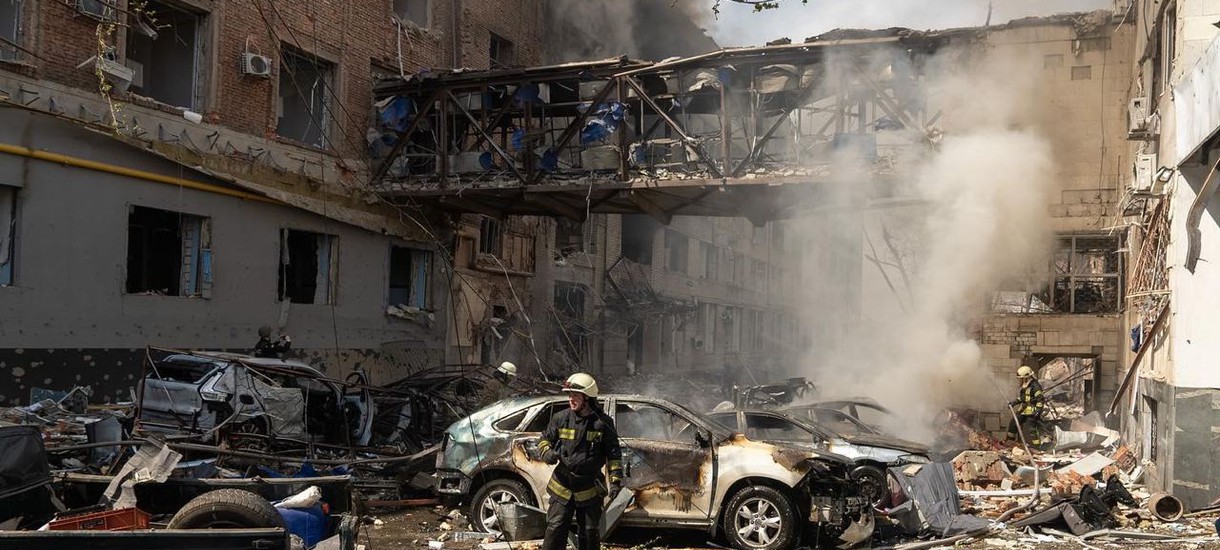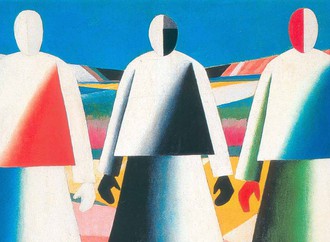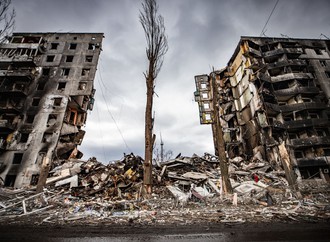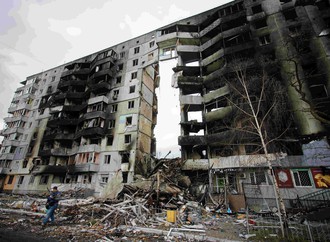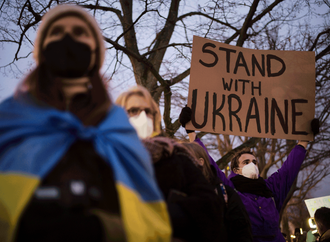We oppose the Russian invasion and call for the immediate withdrawal of all Russian troops from Ukraine. Could you let us know how your family and relations as well as your working-class social activists, and friends? Are they ok in Ukraine and are you communicating with them still? We would like to know the latest of today’s general lives of these people?
Typically for Eastern Europe, a lot of my family had left Ukraine long before the invasion: they live and work in many different countries of the world. My father-in-law and my aunt spent around two weeks hiding in the cellar of their housing in an eastern suburb of Kyiv, but then they finally managed to evacuate. Now they are in Poland, I plan to get them to move to France soon.
As for friends and comrades, some of them have also fled the war – either to Western Ukraine (it suffers from airstrikes but it is far from the frontline) or to the EU. Others remained in place: most of them are now either part of the territorial defence units or organising voluntary activities (helping to evacuate people, bringing food, medicine and other aid, coordinating housing for displaced people and so on). Routine economic activities have stopped in many places, everyday life became fully subordinated to the war: eg the railway evacuates refugees and ensures the transportation of urgently needed goods, the Kyiv metro functions as a bomb shelter, many if not most enterprises closed.
The internet is still working fine in all areas that are not occupied, and I interact with Ukrainian comrades every day.
Among the people killed by the Russians, there is one person I knew personally: a journalist who went to take photos in the occupied areas. Others are so far alive, but of course not very well.
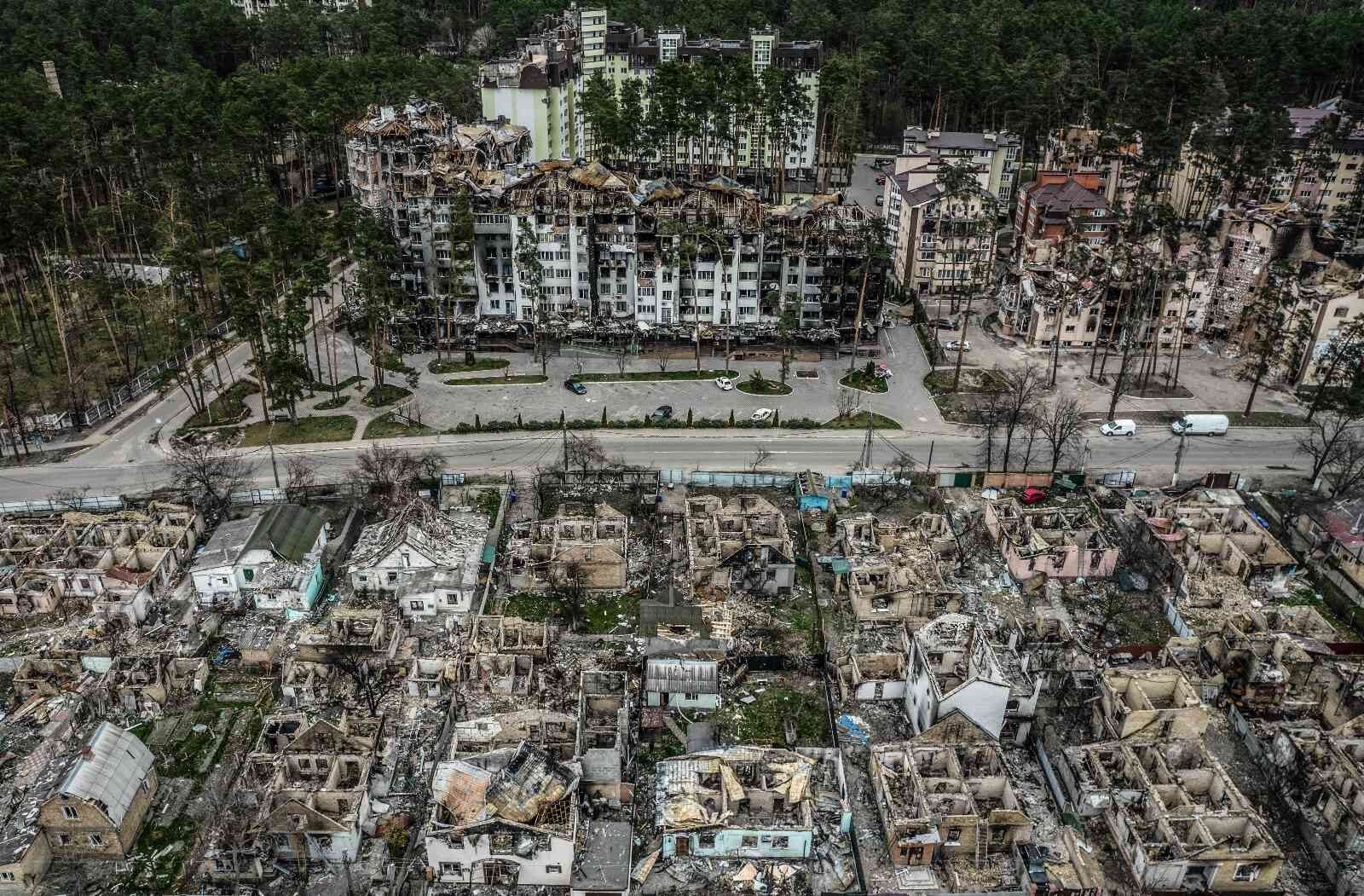
Irpin' city in the suburbs of Kyiv after the occupation / İsmail Coşkun
Ukraine is a borderland between Europe and Russia. How can it be affected?
For the first twenty years of its independent existence, Ukraine existed between these two empires, both the EU and Russia were equally important to the Ukrainian economy. It also remained non-aligned politically. On the personal level, millions of common Ukrainians had and still have relatives in Russia and other countries of the former USSR, but they also have developed the shared ideal of Europe, which is for them a symbol of economic well-being and rule of law. Joining the EU has become an extremely popular idea, especially since the number of Ukrainian migrant workers there started growing.
The EU was not really willing to integrate Ukraine into its structures. For it, Ukraine was just fine as a poor outside neighbour. The EU’s policy was to propose economic collaboration that would not be mutually exclusive with other similar projects (eg you can have the same relations with Russia if you want).
Russia, on the contrary, developed a project of closer integration, in which it would dominate economically and politically. Membership in such a project contradicted the interests of the Ukrainian economy since it would mean cutting ties with the West and succumbing to the economic interests of Russian capitalists. However, it was important for Russia to have Ukraine in this new union: without Ukraine, it is incomplete economically and politically. This is the background for the Euromaidan revolution of 2014, which led to Russia invading Ukraine for the first time, annexing Crimea and supporting separatist movements in the East.
This is how the war began between Ukraine and Russia. During the eight years of this conflict, Ukraine had to cut most of its economic ties with Russia and reorient itself economically and politically much more to the West in order to protect itself.
The Russian government planned to change this situation by implanting the separatist entities back into Ukraine as autonomous units, controlled by Russia. This would give Putin tools to control all the important decisions taken by the Ukrainian government. When it became clear that this was not going to happen, Putin decided to proceed with a full-fledged invasion, bringing the war to the areas that had not been affected by it previously. His aim is to change the regime in Ukraine, installing a puppet government. Failing that (control over the whole Ukraine), Putin wants to divide it, grabbing a part of the country.
The EU and the US support Ukraine diplomatically but they made it clear many times that they will not go to war with Russia. So, Ukraine benefits from the moral support of the West, but it does not really get much money or weapons. Since the beginning of the invasion on the 24 February, Ukraine received 1 billion Euros of aid from the EU, but during this period EU has been paying 1 billion Euros every day to Russia, for its oil and gas.
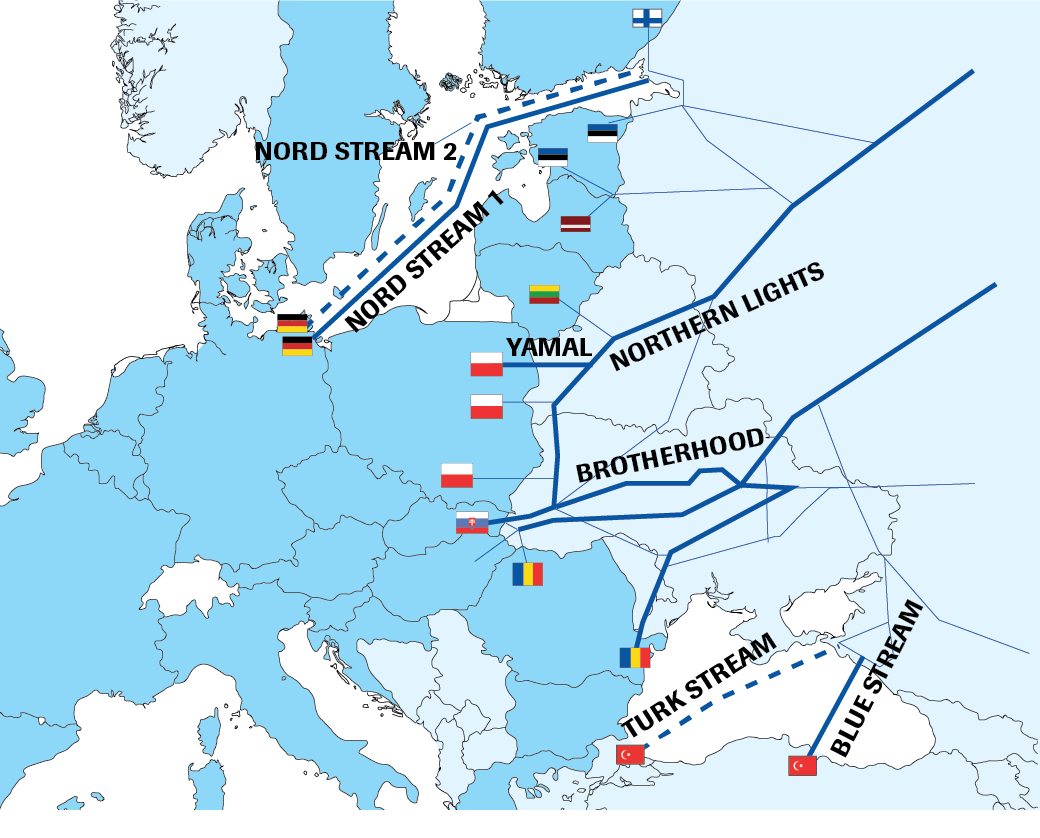
Current pipelines from Russia to EU and pipelines under construction / CIEP
Could you please brief us on the Russian relationship with Ukraine with Lenin, Trotsky and after them, Josef Stalin?
Ukrainian socialists, who formed several Ukrainian governments in the 1917 revolution, held different views about Lenin and the Bolsheviks. Some of them argued for a more or less close union, others for an independent socialist state. However, Lenin was an adamant promoter of the right to national self-determination, specifically with regards to Ukraine. He personally wrote texts shaming Russian chauvinism and nationalism, and his government launched a massive campaign of “Ukrainianisation”: affirming the Ukrainian language and culture in this socialist republic. These politics were also the politics of Trotsky, who also wrote a lot about the importance of Ukrainian self-determination.
Under Stalin, the “Ukrainianisation” politics were curtailed, in 1933 he launched a campaign against the Ukrainian intelligentsia, which coincided with Holodomor: artificial famine in the grain-producing areas such as Ukraine. Similarly to Churchill’s policies in Bengal, Stalin took the grain from peasants who died massively as a result (around four million victims). Ukraine remained a formally separate republic within the USSR, but it was subjugated to a greater degree, especially after Stalin’s nationalist turn during the Second World War (rejecting The Internationale as the official anthem, establishing a hierarchy of nations within the USSR with Russians being dominant, etc).
For Putin, who is nostalgic for the Russian empire destroyed by Lenin, Ukraine is unacceptable as a separate state. He accuses Lenin and Trotsky of ruining the empire and of creating Ukraine artificially. Now he wants to correct this mistake and turn it into a Russian province, as it was under the Tsar. Stalin is more acceptable to Putin as a political leader inasmuch as he restored the imperial character of Russia. When Putin says that the collapse of the USSR was a catastrophe, he means precisely this dimension of imperial might, rather than the respect for the working class or the relative social equality in Soviet time.
You are a social researcher and you are doing your PhD in France on the politics of the working class and you are a left-oriented journalist too. Could you tell me the real situation of working people in Ukraine before the war and right now? As well as what kind of solidarity is going on with the east European working class right now?
Ukrainian workers were not the happiest people in the world even before the war. The level of poverty is quite high, the economic inequality has been growing and many people had to leave the country to work elsewhere. There is no strong political organisation that would represent the workers’ collective interests. Nevertheless, there is a number of militant trade unions that organised impressive strikes in the 1990s and later, notably in the period from 2017-2020. The independent miners’ union, for example, demands to raise the wages in iron ore mines to $1000 from their current level of around $300. The last big strike was held in the adverse politico-economic context of the Covid pandemic: despite the precarious state of the economy, when many enterprises were laying off workers, the miners stayed underground for 42 days and gained significant concessions.
Today these people are mostly participating in the war effort. All the unions I know of are functioning today as emergency organisations, distributing material aid and helping to organise self-defense in Ukrainian cities. The ruling class uses the situation to advance its agenda: recently the parliament passed a law making it easier to lay off workers in the time of war. Certainly, the war does not make life any easier for Ukrainian workers. Besides attacks from the capitalists, now they have to simultaneously repel attacks from the ruling class of another country.
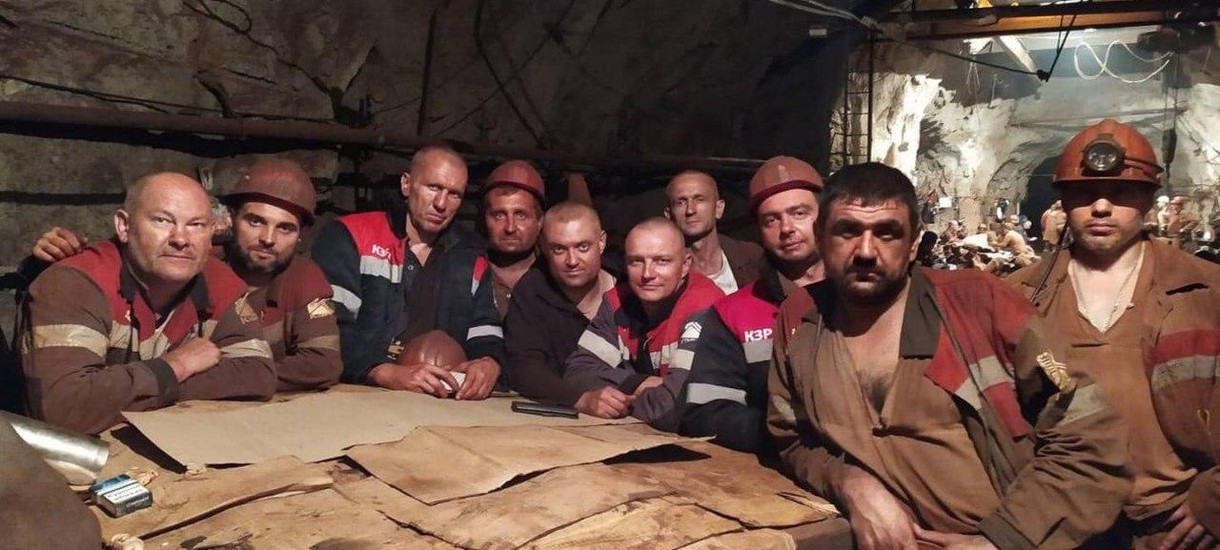
Miners' protest in Kryvyi Rih in autumn 2020, who spent 42 days under the ground fighting for their labour rights
There are many solidarity initiatives currently being launched or already working, on the part of the working class of other countries. For example, our comrades from the Polish trade union Inicjatywa Pracownicza (Workers’ Initiative) are very active in helping Ukrainians at the Polish border. German, Swiss, French trade unions are organizing convoys of aid, modelled after the aid for Bosnian workers in the 1990s. We are also happy that we think alike with Russian comrades from the Russian Socialist Movement (RSD), who also condemn the war and call for the defeat of the Russian imperialists.
There are some socialist internationals today in the world. I think we must have an international of all workers in the world to achieve their dream as a class. Do you have an idea about it?
Certainly, I agree that socialism can only be realized on a global scale, the workers’ movement cannot be confined to the limits of one country. It is extremely important to build meaningful links between socialists in different countries: we in Eastern Europe still know too little about the struggles of workers in South Asia, and I’m afraid the opposite is also true. Only when we learn to exchange practice and theory and coordinate efficiently can we hope to overcome the capitalist system. It is not enough to lead isolated struggles and read old theory books.
Could you let us know what is the recent historical background of this conflict?
I already described briefly the background above. The Minsk agreements, which were supposed to incorporate the separatist territories back into Ukraine as Putin’s levers of influence, were not implemented by either side. In Ukraine, it was hardly imaginable politically: when the government prepared the draft law to change the Constitution allowing to legalise the separatist death squads as “people’s militias” and to allow the separatist leaders to be elected to the parliament, there were huge protests and nationalists killed a military guardsman at the parliament building. In any case, Ukraine refused to take the first steps arguing that before it organises elections in the separatist regions, Russia first needs to cede control over the state border to Ukrainian border guards – otherwise all elections would be meaningless when there is no guarantee that the procedure is correct. Russia refused to do this, and then finally it organised its own elections according to its own laws, making this whole point of the agreements null and void. It also refused to move away from heavy artillery. The final point was in February 2022, when Putin, just before invading Ukraine, formally recognised the separatist states – this puts an end to the Minsk agreements. Seeing that he is unable to subjugate Ukraine politically, he decided to do this militarily.
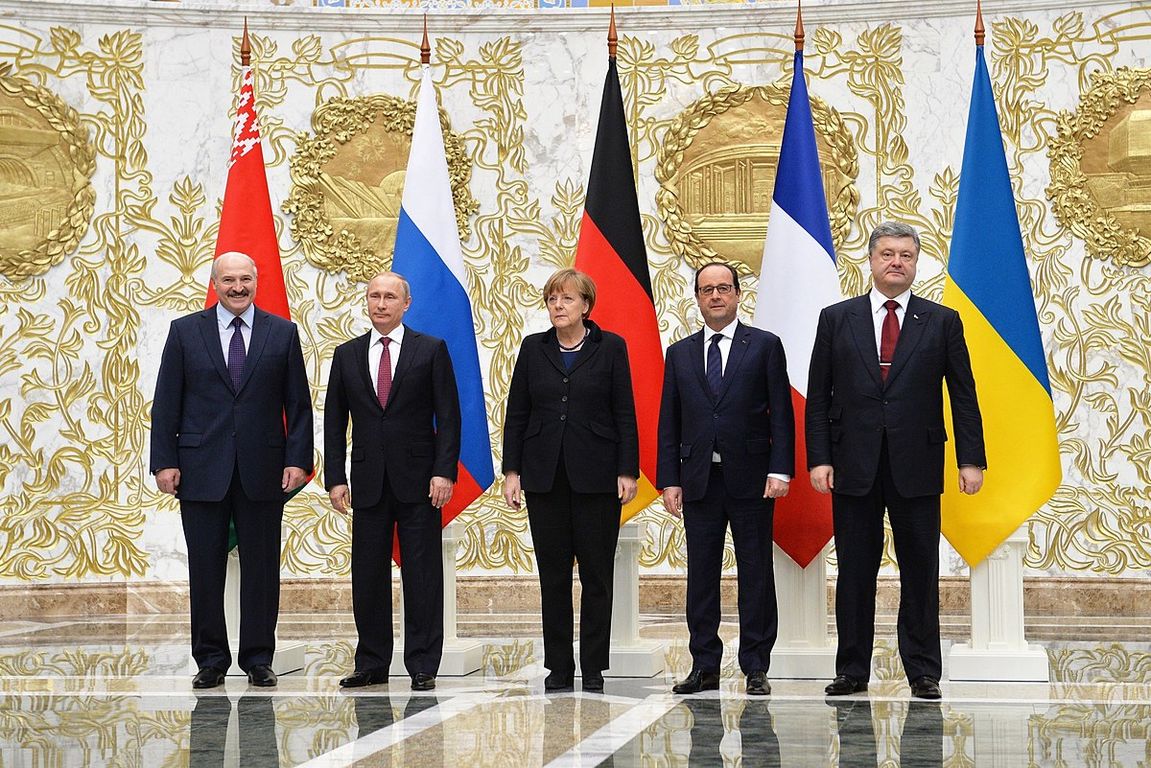
Normandy format talks in Minsk (February 2015): Alexander Lukashenko, Vladimir Putin, Angela Merkel, Francois Hollande, and Petro Poroshenko
Could you explain to us about the Ukrainian economy before 1990 and later? Actually, What are the economic values in Ukraine?
After the breakup of the USSR in 1991, Ukraine started building a capitalist market economy. The first decade was extremely difficult, we lived through a crisis that was much greater than the Great Depression was for the Americans; in fact, Ukraine has never reached the GDP level of 1990.
After the global crisis of 1998, the Ukrainian economy started to recover, finding new sources of growth: instead of the high value-added industries (engineering, machine-building), which turned out to be uncompetitive on the global markets, Ukraine relied on exporting metals, chemicals, and food commodities. This new orientation helped achieve impressive growth in the 2000s, but it stagnated after the end of the commodity prices boom and the beginning of Russian trade wars in 2012 (Ukraine was dependent on Russian gas, as well as on Russian markets for its engineering and food industry). Food (grain and sunflower oil) and metals (including iron ore) exports remain the main sources of national income today.
The economy is mostly privatized. Most of it is owned by oligarchs: big capitalist owners whose concentrated economic assets allow them political and media influence, and these latter factors help them keep their economic property.
If I am correct that Ukraine has banned the Communist Party there. Do you think is it Democracy? And Putin has broken international law by taking brutal military actions against Ukraine and also at the same time he speaks about the Nazi state, what is this and what is the true story?
The Communist Party of Ukraine (CPU) played an important role in Ukrainian politics in the 1990s and early 2000s. By the end of that decade, it lost its independence and became a lesser partner in the government coalition led by the Party of Regions, the main political force representing Ukraine’s richest oligarchs. Its expenses were financed by an oligarchy named Kostiantyn Grigorishyn; in exchange for his financial aid, the party voted for the laws that improved conditions for his businesses.
During the Maidan uprising of 2013-2014, the topic of police brutality played a key role: most people went into the streets as a response to an incident in which the riot police had brutally beaten protesters. CPU was a member of the government coalition at that time. Its official newspaper published an article in which it compared the protesters to the non-White population of the US, who are allegedly “well-fed” and have no reason to protest except for their vile nature. On 16 January 2014 CPU supported a number of repressive laws, including an amendment to the Criminal Code criminalising “extremism”, including “incitements to social discord”. The party that called itself communist supported a neoliberal regime that unleashed riot police against workers and argued for criminal prosecution of the propaganda of class struggle.
These were the conditions in which the Communist Party was banned from participating in elections after that regime was toppled. Unfortunately, this was not all: because of the shameful role the CPU had played in supporting the previous regime, the communist agenda was discredited, too. Laws on “decommunisation” passed in 2016 prohibited the use of all communist symbols. This certainly makes life difficult for Ukrainian leftists, and this is far from an ideal state of democracy. After the new president, Zelenskyi was elected in 2019, there were many hopes that he would normalise this situation. Nevertheless, the Russian attack made all these problems less relevant: Ukrainian leftists today acknowledge that the Russian aggression brings only much more undemocratic restrictions.
As for the “Nazi” character of the Ukrainian state, this is simply not true. It is true that there are far-right political forces in Ukraine, although during the last decade they have never been able to get more than 2-3% at the elections. The nationalists are influential in the liberal civil society but unpopular in the Ukrainian society. It is especially silly to imagine that Zelenskyi, a Jew who speaks Russian and who won the elections with an anti-nationalist programme, is a Nazi, as he is portrayed by the Russian propaganda.
According to the classic Marxist definition of fascism given by Georgi Dimitrov, it is “the open terrorist dictatorship of the most reactionary, most chauvinistic and most imperialist elements of finance capital”. This definition seems to be much closer to the Russian capitalist regime, which unleashed political terror against all anarchist and communist opposition, which holds the reactionary agenda of nostalgia for the Russian empire. Its ruling ideology is chauvinist Russian imperialism, struggling for its exclusive “zones of influence”. Recent articles published by the Russian government press agencies call for genocidal destruction of the Ukrainian nation that is allegedly not real anyway. Nothing of this kind has even been published by the Ukrainian government about Russians or any other nation in the world.
How do you feel about the involvement of China and India in the ongoing war in Ukraine?
Unfortunately, we know too little about each other’s regions. I have to explain the history of Ukraine in great detail, but on the other hand, I don’t know much about the realities of China and India to comment on the involvement and attitudes of their societies. China is often considered an ally of Russia, but it does not seem to be willing to support it explicitly with economic or military aid. Of course it is good news that it does not get involved in the war on Russia’s side. It looks like Chinese imperialism will gain in any case, because Russia, weakened by the war, is already now becoming more and more dependent on China economically.
If Russia wins the war in Ukraine, the ultra-nationalist governments of both China and India will feel encouraged to commit similar attacks against their weaker neighbours and against minorities in their own countries. On the contrary, if Ukraine manages to defeat the Russian aggression, this will be a strong signal, following the US defeat in Afghanistan that imperialists are not allowed to do whatever they want with total impunity. That is why I consider that the war in Ukraine is a matter of interest for the global working class: our victory will mean a safer world for everyone else, too.
Today the global left, except very few, the maximum leftists hide of the slogan of ANTY-AMERICAN and still associated with Soviet Russia. They are repeating this for a long time and I feel that it is badly affected to regain the real socialism in the world. Tell us your opinion on behalf of workers in the world?
Among the left, there can be different opinions about the USSR: it had both progressive and reactionary elements and periods throughout its long history. I personally think that even with all the criticism that one can make against the Soviet Union, it is still important that it offers a progressive project for the whole world, a vision of communism. This is not the case in Russia today. Some leftists living in countries distant from this part of the world believe that Putin’s Russia is somehow a continuation of the USSR, but in fact, it is its total negation. Putin resurrected the ideology of Imperial Russia, which was destroyed by the Bolsheviks, whom Putin hates. That empire is his political ideal. Economically, Russia is a country of wild neoliberal capitalism, with extreme inequalities between the tiny group of ultra-rich and the impoverished majority, but also between the rich cities of Moscow and Saint-Petersburg and the rest of the country that is very poor. Militant trade unions and independent leftist movements are severely persecuted, with activists being tortured in police departments and getting horrible prison sentences (18, 20 years and so on). Culturally, the Russian regime promotes virulent nationalism, domination of the Orthodox church, persecution of minorities, and subjugation of women. I do not understand what can be attractive about that regime for the left.
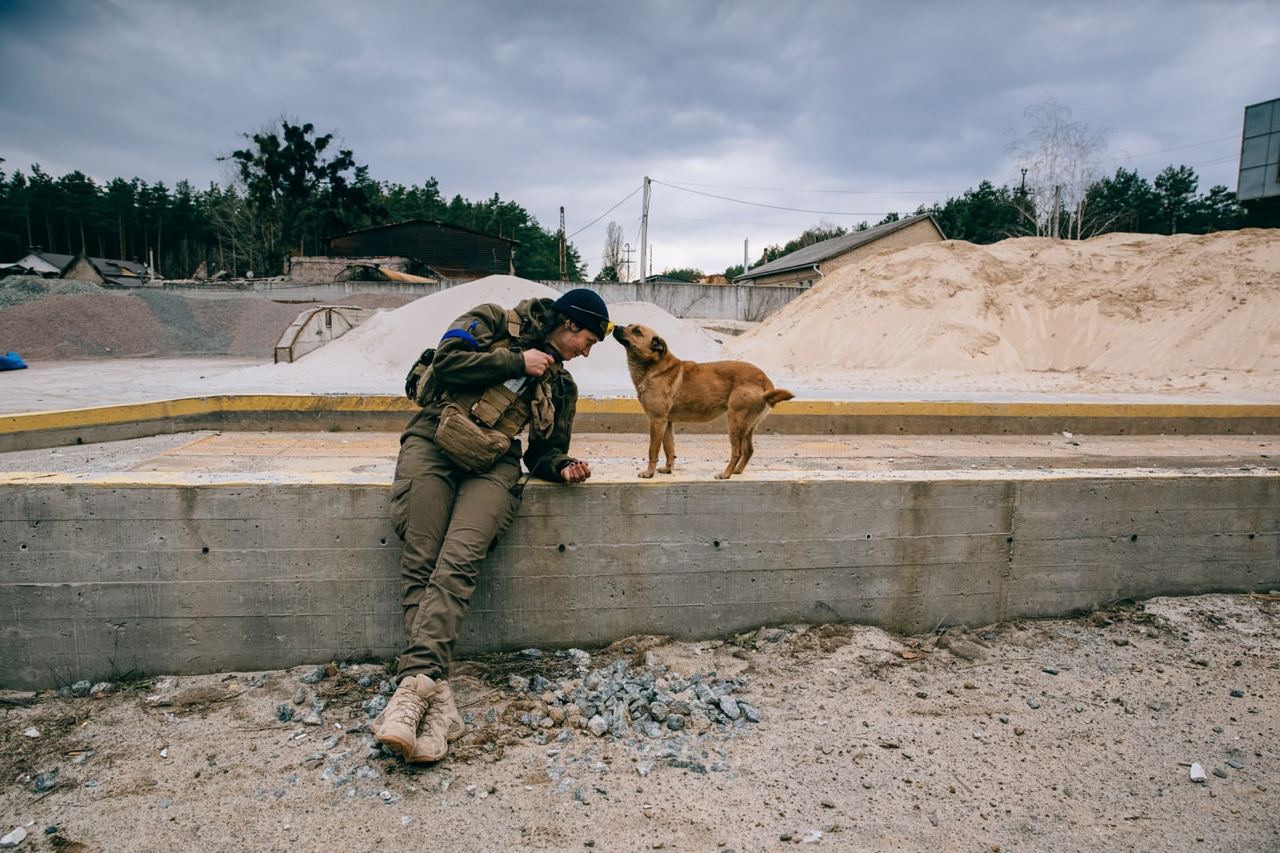
Probably some of them think it is a good idea to support any murderous far-right neoliberal dictatorship that is hostile to the USA. Do they also support the regimes in China, India, Iran, Myanmar, Afghanistan, and Pakistan? Maybe some of them do, for similar reasons. However, I do not share this attitude.
I believe we can only win together, by joining all progressive forces in all the countries of the world, from the US to Russia, Ukraine, India, Sri Lanka, China, and so on, and by ruthlessly fighting the oppressive regimes and the ruling classes. It is useful to remember the fundamental principle of the First International, suggested by Marx: “the emancipation of the working classes must be conquered by the working classes themselves”. We cannot hope that some distant dictator does all the job for us, overcomes capitalism and installs communism, this is a lazy and inefficient strategy. To bring about real socialism on the global scale, we need to work together, building solidarities between labour and socialist movements and developing common strategies. Hopefully, the ongoing war will push us all closer to each other and dissipate illusions that there can be good imperialism. Ukrainian socialists already work together with leftist movements in the US, the UK, the EU, Brazil, Mexico, Russia, and other places. It will be excellent if we also establish friendly and cooperative relations with socialists in South Asia.
